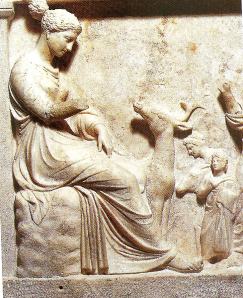 Artemis, one of the most famous Greek gods, has a birth story that sounds like an adventure first thing in the morning. Her parents were Zeus, the king of the gods, and Leto, a sea-tossed Titan woman who found it hard to locate a safe place to have a baby because Hera, Zeus’s wife, wasn’t happy with Zeus’s wandering. Hera tried to hold Leto back from giving birth, which made Leto’s search for a home feel like a legend in the making.
Artemis, one of the most famous Greek gods, has a birth story that sounds like an adventure first thing in the morning. Her parents were Zeus, the king of the gods, and Leto, a sea-tossed Titan woman who found it hard to locate a safe place to have a baby because Hera, Zeus’s wife, wasn’t happy with Zeus’s wandering. Hera tried to hold Leto back from giving birth, which made Leto’s search for a home feel like a legend in the making.
Finally, a small island in the Aegean Sea named Delos offered a sanctuary. The island wasn’t a fixed landmass at first and was more of a drifting bless-ing: a quiet, safe spot where Leto could rest and give birth without Hera’s reach. The gods gathered around, and the moment finally arrived. Artemis was born first—swift and bright, like a northern star guiding the night. She was a perfect, robust child, full of nature’s wild energy and curiosity.

As soon as Artemis arrived, she did something unusual: she helped her mother deliver her twin brother, Apollo. It’s a nice twist to the story because Artemis, who would later become the goddess of the hunt and the moon, was already stepping into a protective, supportive role for family even as a baby herself. Some versions say Artemis was born with a sense of organization and strength that made it natural for her to help with Apollo’s birth. Others simply say she watched over the moment and then focused on her own new world to explore.

After these births, Artemis grew up to be a virgin goddess—stern, wild, and free. She guarded young girls, watched over forests and animals, and carried a moonlit bow and a quiver of silver-terved arrows. Her birthplace on Delos became a symbol of a safe haven, a place where families could hope to welcome a child without fear.
So, the birth of Artemis is not just the arrival of a goddess, but the beginning of a life that would protect and guide the young and the wild for ages to come.